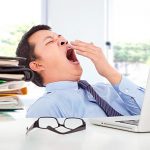 Sleep is well known for the benefits it provides to us at work, not least in buffering the impact of stress. Alas, despite the benefits of good sleep, it’s not something that many of us get. Data suggests that 70% of Americans fail to get sufficient sleep, with up to 70 million having some form of sleep disorder.
Sleep is well known for the benefits it provides to us at work, not least in buffering the impact of stress. Alas, despite the benefits of good sleep, it’s not something that many of us get. Data suggests that 70% of Americans fail to get sufficient sleep, with up to 70 million having some form of sleep disorder.
These sleep disorders may not just impact our productivity at work, but also mean we’re more at risk of redundancy. That’s the finding of a new study from the University of Arizona in Tucson, which found that people suffering from sleep apnea had a higher risk of redundancy.
“These results suggest that undetected obstructive sleep apnea could have long-term, negative effects on vocational functioning,” the researchers explain.
Poor sleep
Untreated sleep apnea can have a number of consequences for sufferers, including fatigue and impairments in cognitive function. The researchers pulled data from the Assessing Daily Activity Patterns through occupational Transitions (ADAPT) study that saw a few hundred volunteers assessed over a period of time.
Some 73% of the volunteers were on hourly wages rather than a salary, with nearly half experiencing multiple job losses during their career, with this number nearly exactly matching the proportion of the volunteers who suffered from sleep apnea.
A few years ago an app was developed by a team from Ben-Gurion University of the Negev (BGU), in Israel to help users detect sleep apnea from the comfort of their home.
The system is fascinating because it promises to help sufferers of obstructive sleep apnea (OSA) whilst they are still awake, all from their smartphone.
“We’ve developed technology that could help diagnose OSA and sleep disorders in a convenient way,” the team say. “The audio-analysis application can record speech signals from awake subjects. Now, we will be able to get a fast, OSA severity estimation without an overnight sleep study.”
At the moment, if you want to be accurately diagnosed for sleep apnea, you have to visit a lab where your brain waves, bloody oxygen, breathing, heart rate, and eye and leg movements are tracked as you sleep.
The new, app based approach, doesn’t require any sensors, but instead utilizes the ambient microphone that is built into most phones. The system then monitors your speech whilst you’re awake, and then records your breathing as you sleep to provide a simpler and much less expensive means of diagnosis.
“All sleep studies conducted in laboratory or at-home settings currently require subjects to be connected to numerous electrodes and sensors,” the team say. “Processing the data on sleep-wake states and corresponding aspects of physiology is time-consuming, tedious and costly because of its complexity and the need for technical expertise. The market is begging for a better solution.”
With sleep apnea appearing to have such dire consequences for our careers, it’s perhaps a test that many more of us should be taking.